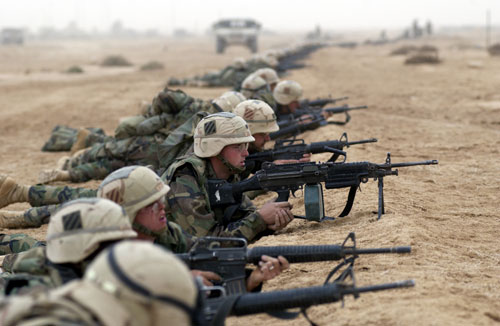Army Troops Reach Baghdad

Army Troops Reach Baghdad
by Sgt. Craig Zentkovich
BAGHDAD INTERNATIONAL AIRPORT, Iraq (Army News Service, April 6, 2003) -- The 1st Brigade Combat Team, led by Task Force 3-69, traveled and fought for 70 kilometers to bring the 3rd Infantry Division (Mech.) to within 30 kilometers of Baghdad April 2.
The movement, which began at 2 a.m., took 1st BCT through the Karbala gap and across the Euphrates River to a position southwest of Baghdad.
"Any night attack with no illumination is going to be tough; tensions will run high," said Lt. Col. Ernest Marcone, TF 3-69 commander. "The troops were superb."
The first objective was the Karbala gap - an area of land 2 kilometers wide that stretches from the reservoir west of Karbala, east to the edge of the city. Shortly before first light, soldiers received small-arms fire from the northern side of the gap from numerous fighting positions.
"After artillery and close-air support eliminated (the Iraqi's) indirect fire capabilities and vehicles, we moved in with infantry dismounts to eliminate the threat," Marcone said. "The end result was 40 or so (enemy prisoners of war), one of them wounded."
The wounded, an Iraqi regular army soldier, was immediately treated by a TF 3-69 medic when the area was secure.
The brigade halted movement 25 kilometers past Karbala to refuel, refit and recon the next objective - a bridge crossing at the Euphrates River.
"The bridge being safe and intact was crucial to us accomplishing our mission," said Capt. Jared Robbins, C Company, 3rd Bn., 69th Armor commander. The last bridge 1st BCT had to secure at the Euphrates River, in Kifl, was rigged with explosives and partially damaged when Iraqi forces detonated it. This time around, a team from the 11th Engineer Battalion traveled by boat across the Euphrates, checking the underside of the bridge to ensure it wasn't laden with explosives.
"The teamwork by the engineers was outstanding," Robbins said. "Their speed and proficiency made it possible for us to cross the bridge in very little time - safely."
The engineers working under the bridge and the security force above were engaged by Iraqi forces on both the north and south sides of the east bank of the river.
"They hit us, all together, with about four or five squads of soldiers," Robbins said. "We took zero friendly casualties."
With the far side of the bridge secure, TF 3-69 was able to cross the bridge and establish an over watch position, with the remainder of 1st BCT not far behind.
"The soldiers have been incredible with either little or no sleep the past two days," Robbins said. "And all of our equipment made it to this point. It says a lot about our soldiers and maintenance crew that we are fully mission capable."
The attack on Karbala and the bridge at the Euphrates River came eight days after the 3rd Infantry Division made an unprecedented two-day movement taking them 300 kilometers into Iraq by March 24 - the fifth day of the ground war.
"This past week in the same location was a drain on the soldiers," said Staff Sgt. Nicholas H. King, C Company, 2nd Battalion, 7th Infantry Regiment squad leader, before the attack. "We're ready go north, get the job done and head home."
(Editor's note: Sgt. Craig Zentkovich is a member of the 50th PAD, traveling with 1st BCT, 3ID.)
 >
>